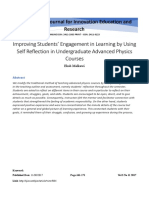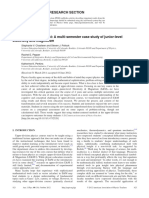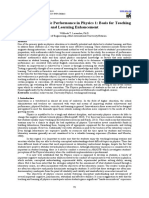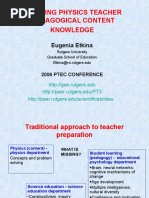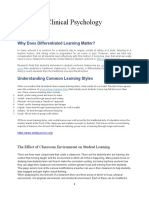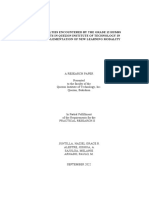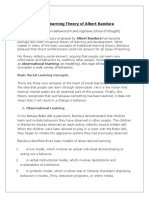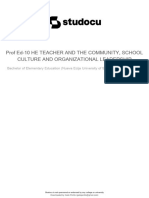Poster
Poster
Uploaded by
wjpiratesOriginal Description:
Copyright
Available Formats
Share this document
Did you find this document useful?
Is this content inappropriate?
Report this DocumentCopyright:
Available Formats
Poster
Poster
Uploaded by
wjpiratesCopyright:
Available Formats
Studio-Based Learning for Novice Physics Students
Ridenour, Joshua The George Washingon University
Abstract
For Many students, taking a physics class can be a daunting task. Particularly for those taking the algebra-based courses (typically non-physics majors)., merely registering for the class can send students into a panic. Recently, studiobased classrooms have emerged as a suitable alternative to standard lecture style classrooms. While there has been extensive research confirming the merit of this pedagogy in calculus-based and advanced courses, little has been done in the way of gauging the effectiveness for novice students. For this study, the first-semester introductory physics classes at The George Washinggton University were taught using each method for different sections. The focus of this study is to improve problem solving skills without sacrificing conceptual understanding. The assessments of each section were administered using the Force Concepts Inventory (FCI) and the Colorado Learning Attitudes about Science Survey (CLASS) diagnostic tests. The studio-based students showed more progress iin both problem solving and conceptual understanding than their lecture counterparts.
Methods
In a studio-based classroom, the role of the instructor has very much evolved. The instructor is seen as more of a coach than a lecturer. The students learning is fostered by group work and self discovery. The students are expected to solve numerous problems with the instructor and TAs as a guide. One very important aspect is the allocation of groups as group dynamics can have a significant influence on individual student outcomes. The structure is such that each group has an advanced, intermediate, and struggling student. It is set up in this way for optimal learning outcomes. Through small labs, called tangibles, students have an opportunity to make physical conncections between the material and the real world. Often in lecture-style classes, there are several days between labs and lecture and lab often are not at the same pace. The outcomes were measured using the FCI, CLASS, as well as the ACCESS method of problem solving that was developed at GWU. The ACCESS method is used for structured problem solving. A major concern with novice students is that they typically begin at the algebraic manipulation process without setting up the problem correctly. The ACCESS method is a systematic approach to becoming a better problem solver by carefully assessing the problem, working it out, and reflecting on what has been accomplished. The rubric associated with the ACCESS method is below.
I.
Conclusion
In the first semester of implementation of studio-based learning in the algebra based course produced very pleasing results. The students showed considerable advancement in their conceptual understanding, exhibiting a higher normalized gain on the FCI than their lecture counterparts. Also, student attitudes improved slightly which is an encouraging sign. Students showed little improvement throughout the semester in their ability to apply the ACCESS rubric, particularly in regards to setting up the problem and creating a useful picture. In the future, more emphasis will be placed on setting up problems correctly. This will be accomplished by solving numerous problems algebraically using only letter variables. Given values, the students seemed to display confidence in their ability to solve the problem without giving thought to the setup or picture.
References
W.K. Adams, K. K. Perkins, et al. New instrument for measuring student beliefs about physics and learning physics. The Colorado learning attitudes about science survey. The American Physical Society, 2006. Hestenes D., Wells M., and Swackhamer G. Force concept inventory. The Physics Teacher, 30:141-166,1992. Louis E. Keiner and Teresa E. Burns. Interactive engagement. How much is enourgh? The Physics Teacher, 48:108-111, February 2010.
Objectives
The goal of this research is to implement novel pedagogy into an introductory physics course. This pedagogy has been successful in more advanced courses, and can easily be adapted for non-physics majors. Using group discovery lessons and self-discovery, students have a chance to make connections and absorb material easier. Many of the students in this class are non-physics majors. These students may not be invested in the material, but the methods of solving physics problems can be a valuable skill and can be attributed to general problem solving. One major goal of this research is to provide an opportunity for these students to advance their problem solving skills. Assessment of student attitudes towards physics and physics problem solving are also assessed.
ACCESS rubric
II. III.
You might also like
- Minds On Physics ....Document35 pagesMinds On Physics ....Matius BiuSarraNo ratings yet
- Melc in Food and Beverage ServicesDocument4 pagesMelc in Food and Beverage ServicesMarjin Adriano88% (17)
- Fla #4 (Beced Ii (The Scool and The Teacher Curriculum)Document9 pagesFla #4 (Beced Ii (The Scool and The Teacher Curriculum)nekiryn67% (3)
- Physics For Students of PhysiotherapyDocument4 pagesPhysics For Students of PhysiotherapyAldo Xavier100% (1)
- The Problem and Its SettingDocument4 pagesThe Problem and Its SettingPatriciaNicoleDuranBesanaNo ratings yet
- T2 - Lillian C. McDermott - Physics Education ResearchDocument13 pagesT2 - Lillian C. McDermott - Physics Education ResearchAnonymous KarinaNo ratings yet
- Transforming The Lowest-Performing Students - An InterventionDocument9 pagesTransforming The Lowest-Performing Students - An InterventionZandy SinetNo ratings yet
- Effect of Five-Step Learning Cycle Model On Students' Understanding of Concepts Related To ElasticityDocument9 pagesEffect of Five-Step Learning Cycle Model On Students' Understanding of Concepts Related To ElasticityNuky Dwifirly Pratiwi ArhathaNo ratings yet
- The Problem and Its ScopeDocument51 pagesThe Problem and Its ScopeHarold Nalla HusayanNo ratings yet
- ThesisDocument39 pagesThesisJeanine CristobalNo ratings yet
- 864-Article Text-1921-1-10-20171203Document12 pages864-Article Text-1921-1-10-20171203Andi GianNo ratings yet
- Heckler Sayre AjpDocument10 pagesHeckler Sayre Ajpalpha arquimedesNo ratings yet
- Sample Chapter 5Document3 pagesSample Chapter 5Princess Andrea GarciaNo ratings yet
- Optics SpecialisedDocument16 pagesOptics SpecialisedKBNo ratings yet
- A Journey To Journal Writing Significance of Non-Threatening Assessment in The Remedial Class of Grade 12 General Biology 1 StudentsDocument7 pagesA Journey To Journal Writing Significance of Non-Threatening Assessment in The Remedial Class of Grade 12 General Biology 1 StudentsInternational Journal of Innovative Science and Research TechnologyNo ratings yet
- Establishing Trigonometric Identities: THE STUDY ApproachDocument2 pagesEstablishing Trigonometric Identities: THE STUDY ApproachLesson Study ProjectNo ratings yet
- Chasteen-Thinking Like A Physicist-AJPDocument8 pagesChasteen-Thinking Like A Physicist-AJPEdsonVargasNo ratings yet
- Research PaperDocument10 pagesResearch Paperapi-340715459No ratings yet
- FINAL FINAL - A Visual and Intuitive Approach To Learning Concepts in Wave TheoryDocument19 pagesFINAL FINAL - A Visual and Intuitive Approach To Learning Concepts in Wave Theoryt_rajith1179No ratings yet
- Lord 1998Document10 pagesLord 1998api-329324684No ratings yet
- Students' Academic Performance in Physics 1: Basis For Teaching and Learning EnhancementDocument7 pagesStudents' Academic Performance in Physics 1: Basis For Teaching and Learning EnhancementDiana VelascoNo ratings yet
- 1 PBDocument6 pages1 PBalimsumarnoNo ratings yet
- Use of Mnemonics - Gabule, Et - AlDocument9 pagesUse of Mnemonics - Gabule, Et - AldanielNo ratings yet
- Research As A Guide To Improving Student Learning: An Example From Introductory PhysicsDocument6 pagesResearch As A Guide To Improving Student Learning: An Example From Introductory PhysicsMrsriyansyahNo ratings yet
- Sobre Os Labs de FísicaDocument9 pagesSobre Os Labs de FísicaBen InstallNo ratings yet
- Rich Et AlDocument4 pagesRich Et AlShaziaNo ratings yet
- New Methods For Teaching Introductory Physics To Non-MajorsDocument11 pagesNew Methods For Teaching Introductory Physics To Non-MajorsGanesh KumarNo ratings yet
- Learning StylesDocument73 pagesLearning StylesJonard Pacres AbrasadoNo ratings yet
- An Implementation of Physics by Inquiry in A Large-Enrollment ClassDocument6 pagesAn Implementation of Physics by Inquiry in A Large-Enrollment ClassÁlvaro SuárezNo ratings yet
- Etkina TeacherContentKnowledgeDocument28 pagesEtkina TeacherContentKnowledgeMrsriyansyahNo ratings yet
- Second Time Is A Charm: The Impact of Correcting Missed Exam Questions On Student LearningDocument10 pagesSecond Time Is A Charm: The Impact of Correcting Missed Exam Questions On Student Learninglyndon_baker_1No ratings yet
- Revised CbarDocument31 pagesRevised CbarAbubakar Tamama CasasawanNo ratings yet
- Ninth Grade Physical Science Students' Achievements in Math Using A Modeling Physical Science CurriculumDocument18 pagesNinth Grade Physical Science Students' Achievements in Math Using A Modeling Physical Science CurriculumDavid GiraldoNo ratings yet
- The Influence of Web-Based Homework On Quantitative Problem-Solving in A University Physics ClassDocument9 pagesThe Influence of Web-Based Homework On Quantitative Problem-Solving in A University Physics ClassKeri SawyerNo ratings yet
- Lisa Erikson EERA 2011 TakewayDocument15 pagesLisa Erikson EERA 2011 TakewaydrlisaeNo ratings yet
- Drinkwater ManagingActiveLearning 2014Document17 pagesDrinkwater ManagingActiveLearning 2014sanziaNo ratings yet
- Alaisa Mamasabang Cpter 1-5Document24 pagesAlaisa Mamasabang Cpter 1-5AHOUR PANGILAYANNo ratings yet
- The Applying of Problem Based Learning Models in An Effort To Improve Science Procees Skill For LearnersDocument11 pagesThe Applying of Problem Based Learning Models in An Effort To Improve Science Procees Skill For LearnersNoval SutaryaNo ratings yet
- 2 PBDocument8 pages2 PBPdt.Mangasi H RajagukgukNo ratings yet
- Pedagogy in PhysicsDocument4 pagesPedagogy in Physicskimshady26No ratings yet
- A New Comparison of Active Learning Strategies To Traditional Lectures For Teaching College AstronomyDocument18 pagesA New Comparison of Active Learning Strategies To Traditional Lectures For Teaching College AstronomyMhyles MarinasNo ratings yet
- Preparing Teachers To Teach Physics and Physical Science by InquiryDocument15 pagesPreparing Teachers To Teach Physics and Physical Science by InquiryNirmala Kumari KNo ratings yet
- Edpe 111 DagocDocument4 pagesEdpe 111 DagocJecel Love DagocNo ratings yet
- Leatherman2019 PDFDocument18 pagesLeatherman2019 PDFSeptika RahmawatiNo ratings yet
- Pedagogical Content Knowledge: Eugenia EtkinaDocument25 pagesPedagogical Content Knowledge: Eugenia Etkinamm_7582No ratings yet
- BOE PacketDocument27 pagesBOE PacketfnoscheseNo ratings yet
- Hoshower & Chen (2005) Persuading Students of Their Responsibilities in The Learning ProcessDocument10 pagesHoshower & Chen (2005) Persuading Students of Their Responsibilities in The Learning Processlaikm-wj23No ratings yet
- Review of Related LiteratureDocument12 pagesReview of Related LiteratureJell LeeNo ratings yet
- Assessment Writing-Based - RubricDocument7 pagesAssessment Writing-Based - RubricdayafterNo ratings yet
- 2012 Thinking Like Physicist AJP000923Document10 pages2012 Thinking Like Physicist AJP000923Dewyani Patil-ChaudhariNo ratings yet
- Research Report: Title: To What Extent Do Study Habits Relate To Performance?Document4 pagesResearch Report: Title: To What Extent Do Study Habits Relate To Performance?Jocelyn JarabeNo ratings yet
- CawleyDocument14 pagesCawleyNor HidayahNo ratings yet
- Cllas RoomDocument6 pagesCllas RoomMarwan F. HamadaminNo ratings yet
- Chapter 1 SOPDocument15 pagesChapter 1 SOPJassien Moring FlorentinoNo ratings yet
- Research FinalDocument23 pagesResearch FinalJeraldine Alvarez AcloNo ratings yet
- The Use of An Active Learning Approach in A SCALE-UP Learning Space Improves Academic Performance in Undergraduate General BiologyDocument13 pagesThe Use of An Active Learning Approach in A SCALE-UP Learning Space Improves Academic Performance in Undergraduate General Biologylulu purwaningrumNo ratings yet
- Edsc-Epistemic Text LessonDocument7 pagesEdsc-Epistemic Text Lessonapi-300700376No ratings yet
- HomeworkDocument21 pagesHomeworkmayNo ratings yet
- Lord&Baviskar BloomsDocument6 pagesLord&Baviskar BloomsZau Jum SinyuNo ratings yet
- Pip Report FindingsDocument7 pagesPip Report Findingsapi-427559206No ratings yet
- Implementing Cognitive Science and Discipline-Based Education Research in The Undergraduate Science ClassroomDocument8 pagesImplementing Cognitive Science and Discipline-Based Education Research in The Undergraduate Science ClassroomAldan Rae TuboNo ratings yet
- Uncovering Student Ideas in Physical Science, Volume 1: 45 New Force and Motion Assessment ProbesFrom EverandUncovering Student Ideas in Physical Science, Volume 1: 45 New Force and Motion Assessment ProbesRating: 5 out of 5 stars5/5 (1)
- GRADE 1 To 12 Daily Lesson Log School Grade Level 7/8 Teacher Learning Area T.L.E. Teaching Dates and Time 1 Hour QuarterDocument4 pagesGRADE 1 To 12 Daily Lesson Log School Grade Level 7/8 Teacher Learning Area T.L.E. Teaching Dates and Time 1 Hour QuarterLauro Albano Jr.No ratings yet
- Social Learning Theory of Albert BanduraDocument3 pagesSocial Learning Theory of Albert BanduraSyed Talha Kamal0% (1)
- Rationale For Evaluation in Educational ManagementDocument3 pagesRationale For Evaluation in Educational ManagementLamNaThisNo ratings yet
- UOIT Academic Calendar 2010Document306 pagesUOIT Academic Calendar 2010uoitNo ratings yet
- Teaching: For High PotentialDocument4 pagesTeaching: For High PotentialRaicu DanielaNo ratings yet
- Module 1 Quizzes, TEFL FULL CIRCLEDocument4 pagesModule 1 Quizzes, TEFL FULL CIRCLESaeisenbartNo ratings yet
- Gaps in APDocument2 pagesGaps in APJosephine Bayangos UllaNo ratings yet
- Triangle Inequality Theorem #3Document5 pagesTriangle Inequality Theorem #3Vanessa G. ManguilimotanNo ratings yet
- Lesson Plan - There Is or There Are (Mixed)Document5 pagesLesson Plan - There Is or There Are (Mixed)Mihaela IorgulescuNo ratings yet
- Getting Started With Team Topologies - v1Document1 pageGetting Started With Team Topologies - v1v.karthik9993100% (1)
- Attitude and ValuesDocument7 pagesAttitude and ValuesNeelam harchandaniNo ratings yet
- Pe 101 Course Guide Sy 2022 2023Document8 pagesPe 101 Course Guide Sy 2022 2023bhfhewknsNo ratings yet
- PT Worksheet 1 Summary Covid 20-21-1Document3 pagesPT Worksheet 1 Summary Covid 20-21-1Mitchel BibarNo ratings yet
- Teaching Lean Manufacturing With Simulations and Games: A Survey and Future DirectionsDocument22 pagesTeaching Lean Manufacturing With Simulations and Games: A Survey and Future DirectionsValaki MimiNo ratings yet
- Curriculum Theory and Practice - KLP 1, 2, 3Document15 pagesCurriculum Theory and Practice - KLP 1, 2, 3andi sultanNo ratings yet
- L12 Reading PassageDocument8 pagesL12 Reading PassageCalonneFrNo ratings yet
- Do It YourselfDocument1 pageDo It YourselfJasmin SalamNo ratings yet
- 5e Lesson PlanDocument6 pages5e Lesson Planapi-400621549No ratings yet
- Unit 1Document19 pagesUnit 1obtnrNo ratings yet
- BAYONOTESDocument4 pagesBAYONOTESPaul Jos Lei VelascoNo ratings yet
- Reviewer in Professional Education Focus: Curriculum Development and Educational TechnologyDocument36 pagesReviewer in Professional Education Focus: Curriculum Development and Educational TechnologyBern Balingit-ArnaizNo ratings yet
- TylerDocument11 pagesTylerSharla DimaculanganNo ratings yet
- 2001 Kumaravadivelu Postmethod PedagogyDocument24 pages2001 Kumaravadivelu Postmethod PedagogyAlejandro McNeil100% (1)
- Content Analysis of 6Th Grade Science Textbook: Made By: Rashmi, Kavita, ReshmiDocument9 pagesContent Analysis of 6Th Grade Science Textbook: Made By: Rashmi, Kavita, ReshmiRASHMINo ratings yet
- Saputo Letter of Recommendation 2015-SignedDocument1 pageSaputo Letter of Recommendation 2015-Signedapi-251393607No ratings yet
- The-teacher-and-the-community-school-culture-and-organizational-leadership-NUEVA ECIJADocument56 pagesThe-teacher-and-the-community-school-culture-and-organizational-leadership-NUEVA ECIJAGaile Perillo100% (2)
- 2020-2021 Secondary Literacy Team AgendaDocument10 pages2020-2021 Secondary Literacy Team Agendaapi-352820618No ratings yet
- Teaching Strat & MethodDocument50 pagesTeaching Strat & MethodkayelaurenteNo ratings yet










